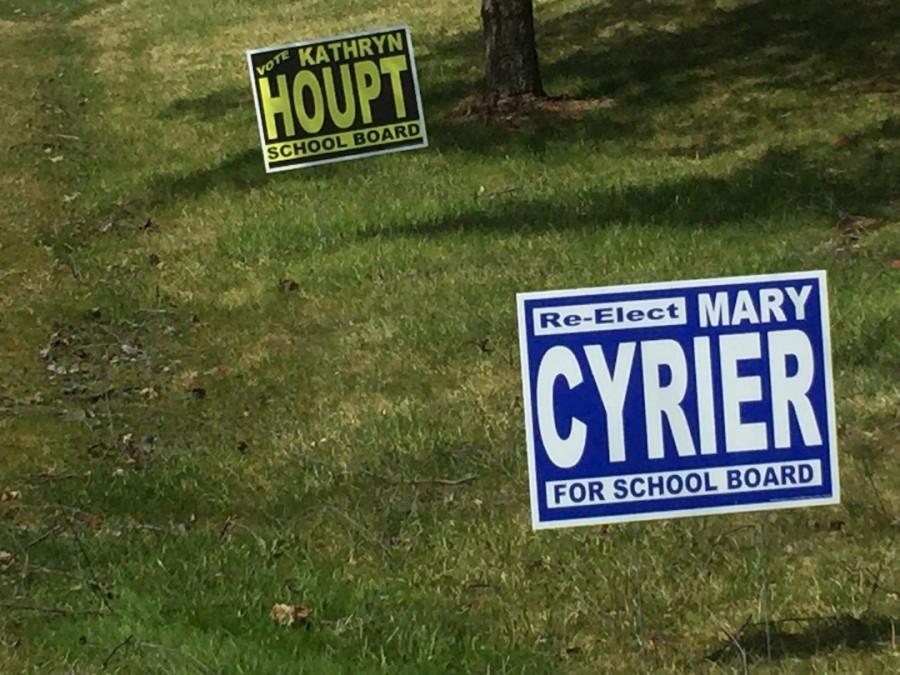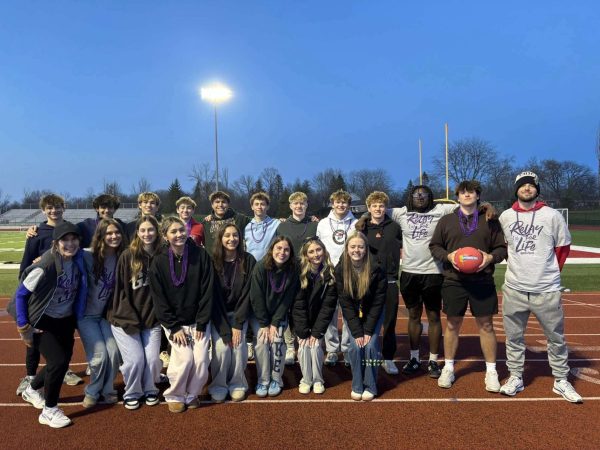Candidates describe their stances in the upcoming Mequon elections
Reassessing voter registration status, reviewing candidates’ policy stances and checking election dates, many prepare to cast their ballot as Mequon’s election season rolls in.
Currently, candidates are vying for three seats in the Common Council of Mequon: Mayor Dan Abendroth, incumbent, will face Dr. Aaron Armstrong, challenger, for the position of mayor; Mr. Robert Strzelczyk, incumbent, will face Mr. Edward Soleski, challenger, for the position of alderman of District 1; Mr. John Leszczynski did not seek re-election, so Ms. Janette Braverman and Mr. John Wirth will face each other for the position of alderwoman or alderman of District 4.
At the same time, there are elections occurring for two seats on the Mequon-Thiensville School Board. Ms. Christine Schultz and Mr. Aaron Hurvitz are challenging incumbent board members Ms. Mary Cyrier and Ms. Kathryn Houpt for their spots.
Votes shall be cast on April 5.
Contrary to common misconceptions, local government, which includes the Common Council and the School Board, influences the lives of its residents far more than the national government does. Adhering to this principle, these local governmental institutions, such as the Common Council and the School Board, possess various significant powers.
According to the Common Council, Mequon’s municipal form of government, “the fundamental job of the Common Council is to make policy decisions for the City based on relevant and accurate information received from the full-time City Administrator and his staff.” Elaborating further, they said, “The four standing committees of the Common Council [– the Finance-Personnel Committee, Public Safety Committee, Public Welfare Committee and Public Works Committee –] deliver recommendations to the full body regarding local facilities, projects, services, finance and personnel, as well as issues of health, safety and welfare of the community at large.”
Thus, under these stipulations, the Common Council has, but is not limited to, the following legislative powers in regards to the City: reviewing and approving payment of all bills and license applications; assessing and collecting local taxes; handling matters related to police, fire, traffic, boating and building regulations; dealing with matters related to health, community services and nuisances; managing issues related to public works projects and citizen concerns involving streets, lighting, sewers and water and city-owned properties; maintenance of public and private property.
Likewise, the School Board’s duties involve monitoring student achievement and exercising general supervision over schools; enacting, altering or repealing rules and regulations for the school in regards to district priorities; setting the goals and operational policies that the district administrator needs to carry out; evaluating school operations; adopting a budget for the school district; communicating with the public; and advocating the importance of scholarly endeavors among the community.
The mayor wields limited authority in the Common Council. Operating under State Statute Chapter 62, the Common Council is classified as a “Weak-Mayor Council” system of government, meaning that the mayor plays a more subdued role in local politics.
Within these restrictions, the mayor has restrained legislative powers. According to Mequon Ordinance Section 2-30 (a) (14), because all ordinances, resolutions and laws require five affirmative votes in order to be enacted, the mayor may vote only when a fifth vote is necessary to break up a four-four tie.
However, the mayor does possess more weighty executive authority within these limitations. To grant the mayor executive powers, the system allows him or her to veto any legislative actions by the Common Council, which can only be overridden by a two-thirds vote of the nine Common Council members. Additionally, the mayor presides over Common Council meetings and may appoint citizens as members to the City Boards and Commissions, such as the Economic Development Board and the Planning Commission, with five affirmative votes from the Common Council.
Elected as mayor in 2013, Mayor Dan Abendroth, the incumbent in the race, seeks to serve another three-year term in this position. To fortify his reelection platform, Mayor Abendroth boasts his future goals, experience and accomplishments in office.
Explaining his future goals, Mayor Abendroth stated that he plans to build upon the administration that he has formed over the past three years.
“My goal is to create and maintain the kind of community residents want,” Mayor Abendroth said. “This includes keeping taxes low–they have not been increased for the past seven years; maintaining professional and efficient city services–we have reduced the number of city employees by 17 over the past 15 years; encouraging quality economic development that is consistent with the city’s vision and standards; increasing the entertainment and recreational opportunities for families; and fostering teamwork and cooperation amongst the Common Council, staff and other civic organizations.”
Mayor Abendroth also points to his extensive experience as his qualifications for mayor. Serving in the government of Mequon for 30 years, he has been District 1’s alderman from 1986 to 2013, the Common Council president for four terms, a Mequon Planning Commission chairman since 2013 and the mayor of Mequon since 2013. Over the course of those decades, he has also participated on more than 25 city commissions, committees and boards, such as the Economic Development Board, Appropriations Committee and Planning Commission.
These goals and breadth of experience manifested themselves through his various acts and accomplishments.
Mayor Abendroth helped facilitate achievements such as authoring the City’s Long Range Transportation Plan, in which he claimed that he helped the Mequon Engineering Department do a facilities inventory and that he helped write the text of the plan; championed a joint strategy between the city, various environmental organizations and Ozaukee County to protect and restore critical land and water resources in Mequon; and aided in the financial management of the city, whose low debt and stable tax rate won it three awards from the national Governmental Finance Officers Association.
Mayor Abendroth has also played a role in various other legislative acts. Mayor Abendroth claims that he has used his tiebreaker vote “to allow indoor shooting ranges as a conditional use in the city’s industrial zoning districts” and that, in 2008, he opposed the passed law that created the Town Center Tax Incremental Financing district because he felt that “the new Town Center zoning code, which allowed increased development density, was enough of an incentive for development interest.”
Challenging Mayor Abendroth for his position, Dr. Aaron Armstrong seeks to win the mayoral candidacy. To strengthen his stance, Dr. Armstrong announces his goals and his large range of non-governmental experience.
Holding traditional conservative values, Dr. Armstrong’s goals mainly revolve around creating a more effective, efficient government and enabling more open and transparent communication between the government and its constituents.
Expressing his stance, Dr. Armstrong expressed the belief that Mequon’s current government is unwieldy and inefficient.
“I think that the problem we have with our local government lately is that our officials have too much political experience,” Dr. Armstrong said. “In the private sector, we are focused on improving our service and lowering costs, and the government has been doing the opposite. Switching to a more private sector-like approach would be an advantage, especially during this year, when voters have been unhappy with how the government has been operating at all levels.”
Dr. Armstrong further explained his opinion. “I believe that I can bring greater openness to the government,” Dr. Armstrong stated. “Mayor Abendroth had almost four times as many closed meetings during his tenure than his predecessor had, and we need more transparency.”
“We need more transparency; many decisions are made behind closed doors, and they need more transparency and input from the community,” Dr. Armstrong said. “By bringing an outside perspective to local government, we’d manage to bring quality service to all the cities in Mequon.”
In terms of specific policies, Dr. Armstrong expressed that his main aims would be to “limit the use of tax increment financing, have open listening sections where [he] goes to different locations to talk with the residents of Mequon on a regular basis, make sure that our parks and facilities are used in a way that provides enjoyment to the residents of Mequon and preserve the character of Mequon.”
Dr. Armstrong possesses a breadth of non-political experience, which includes but is not limited to, receiving a Master’s degree in real estate and urban land economics, serving as the chief technical officer in a software company and being the owner of Armstrong Engineering LLC.
Explaining how his experience would contribute to success in government, Dr. Armstrong emphasizes his efficiency. “Applying these business skills at City Hall will cut waste and improve the productivity, efficiency, responsiveness and quality of city services,” Dr. Armstrong said.
Dr. Armstrong elaborated further. “[My] fact-based approach examines both sides of the balance sheet and insures thoughtful, planned, organic growth that adds value and keeps in touch with the character of the community,” Dr. Armstrong claimed.
Coordinating with the mayor, the Common Council’s eight aldermen determine the City’s policies, both for Mequon as a whole and their specific districts.
In the aldermanic race for District 1, Alderman Robert Strzelczyk will face Mr. Edward Soleski.
Elected in 2013, Alderman Robert Strzelczyk desires another three-year term in office. Alderman Strzelczyk focuses his reelection campaign on his goals, experience and accomplishments in office.
Listing his goals, Alderman Strzelczyk claimed that he wishes to maintain and strengthen the “long term strength of Mequon” through a “collaborative approach to community building, working closely with our residents, schools, businesses and neighboring communities.”
Alderman Strzelczyk stated that his goals depend on three components: “protect[ing] our rural feel, low tax rates and strong property values; build[ing] our business tax base with companies that provide needed resources and generate a stronger sense of community for current and future families; keeping Mequon a lifelong community by encouraging interest from families with school-age children and by inviting living opportunities for empty nesters.”
These goals are a result of Alderman Strzelczyk’s greatest concerns, especially those relating to the declining enrollment at Mequon-Thiensville School District schools and the current business tax rate.
Expressing his worry over enrollment rates, Alderman Strzelczyk stated, “Mequon-Thiensville schools have seen declining enrollment since the 1990s, while neighboring communities, such as Germantown, Cedarburg and Grafton, have increased or maintained their student population. This places critical funding at risk and makes it difficult to continue providing the standard in education our population requires.”
To elaborate on his concerns over the current tax rate, Alderman Strzelczyk said, “Our current business tax base does not support the rising costs of maintaining Mequon’s roads and city services, and District 1 has the largest footprint in the City of Mequon with its miles of rural roads requiring maintenance. This will negatively impact our cherished low tax rates and residents’ quality of life if we don’t want to reverse Mequon’s increasing pattern of borrowing funds.”
Alderman Strzelczyk wields a combination of both political and business experience. To showcase his array of political skills, Alderman Strzelczyk claimed that, in addition to spending three years as alderman, he has also served “at least one year on the Planning Commission, Finance and Personnel, Public Welfare, Park Board and Bike and Pedestrian Committee.”
Alderman Strzelczyk also possesses a variety of business experience. “I received a BA in business management, and the emphasis in marketing provides me with the skillset necessary to address city finances, plan for economic stability and develop the desired ‘brand’ for Mequon,” Alderman Strzelczyk explained. “Based on my qualifications, I was appointed to Mequon’s Branding Committee by Mayor Dan Abendroth.”
Utilizing his political and business experience, Alderman Strzelczyk plans to combine the skills from both realms to yield greater efficiency and results in the Common Council.
To provide proof of the benefits of his reelection, Alderman Strzelczyk indicates his accomplishments. He takes credit for Mequon’s “prudent economic growth and decreasing turnover in local businesses” and for the “new options for potential residents in conservation subdivisions that promote open space and allow for larger buffers between new neighborhoods and existing homes.”
In opposition to Alderman Strzelczyk’s reelection bid, Mr. Edward Soleski also aims to be the alderman of District 1.
As a challenger, Mr. Soleski concentrates his election campaign around his goals and experience.
Many of Mr. Soleski’s goals concentrate on engagement with the community and the preservation of Mequon’s character.
Mr. Soleski explained what he would do if elected. “The first thing I will do is be more responsive to the residents than our current alderman,” Mr. Soleski stated. “I am running as a representative of the people. They will know who I am, what is happening at City Hall and what is being proposed, not just after the decisions are made.
Also, Mr. Soleski identifies his intent to help resolve issues between farmers and residents as a main goal in his campaign.
Moreover, Mr. Soleski plans to maintain Mequon’s character by “protecting the land west of 76th Street, which developers look at as red meat ripe for development, and whose current requirements include a 5-acre minimum parcel along with well and septic.”
“I intend to keep the [land] this way. I will not vote for any sewer and water extensions past 76th Street or along it,” Mr. Soleski said. “We need to preserve our rural heritage in this area and Mequon’s character.”
In addition, Mr. Soleski addressed further issues with this current proposal. “The city recently provided sewer and water to a new subdivision west of 76th that has lots as small as 1 acre; they had to change the zoning to do this,” Mr. Soleski said. “The city should have first made it a priority to repair the failing east trunk sewer line since residents there have been complaining for years about sewage backups in their basements.”
Mr. Soleski’s experience involves his qualifications as an engineer and a taxpayer.
As an engineer, Mr. Soleski views issues from a particular lens. “I am an engineer; as a result, I tend to look at any issue from an analytical point of view,” Mr. Soleski stated. “I look at all the ramifications of a decision, both in the short and long term, which includes its outcome and unintended consequences.”
In the same vein, Mr. Soleski believes that, as a taxpayer, he knows what policies will be the best for constituents.
“I am a fiscal conservative, and so I will insure that all expenditures are necessary and that taxpayer money is used in a prudent manner,” Mr. Soleski said. “Paying millions in incentives to developers does not meet this requirement. I always insure that I get the maximum value from any expenditure I make.”
After Alderman John Leszczynski did not seek re-election, Ms. Janette Braverman and Mr. John Wirth will be challenging each other for the position of alderwoman or alderman of District 4.
Ms. Braverman, endorsed by former Alderman John Leszczynski, concentrates her election campaign on her own set of goals and experience.
Ms. Braverman described building stronger relationships and improving communication with residents as a significant goal of hers.
Expressing this desire, Ms. Braverman said, “For 20 years, I have implemented strategies that foster stronger relationships and two-way communication between leaders and stakeholders. I would like residents to feel valued and protected. Listening, researching issues, following through and collaborating to reach consensus are my strengths.”
Ms. Braverman’s focus also includes, but is not limited to, “supporting the continuance of academic excellence across our school district, keeping taxes low while preserving property values through sound fiscal management and supporting community growth that is strategically planned along with detailed analysis that includes input from the community at large.”
Elaborating further, Ms. Braverman stated, “One of the most important issues facing the City of Mequon will be staying connected with the community to effectively implement the changes occurring around us that are inevitable, while keeping a balanced budget, neighborhoods safe, roads maintained and a high-performing school district.”
After meeting with a number of District 4 residents, Ms. Braverman was made aware of traffic, drainage and density concerns regarding new developments west of River Barn Park and south of Knightsbridge. These are also areas that she would like to focus on.
Ms. Braverman then added, “A strong, collaborative leadership team is needed to ensure that strategic goals are met and that concerns are addressed along the way. New developments will need to increase our tax base as planned so that a heavier tax burden is not placed on residents. Continuing to provide community awareness during each development phase will contribute to building more support.”
Regarding enacting new policies, Ms. Braverman stated, “There are none that I wish to introduce at this time. I believe that Mequon is dealing with a lot of change right now in addition to the potential for new leadership this election year. We need to focus on the current issues at hand.”
In terms of her qualifications, Ms. Braverman possesses a large range of experience across various industries, including information technology, manufacturing and engineering.
Discussing her experience, Ms. Braverman explained, “I am experienced in managing multimillion dollar portfolios with a mix of information technology and business process improvement programs.”
“I have delivered cost-effective business solutions through collaboration with global leadership, which includes finding common ground despite individual views or opinions,” Ms. Braverman stated. “I have been active for over 10 years in the Mequon-Thiensville School District and have served on not-for-profit boards and committees across Wisconsin. I’ve delivered successful business strategies across various organizations, including Harley Davidson and Rockwell Automation. I am committed to using my background and experience in the private sector and collaborative leadership style to ensure that we’re making the best decisions for our residents and City.”
Likewise, Mr. John Wirth also aims for the position of alderman of District 4.
Representing the district for 12 years, Mr. Wirth then decided to not seek reelection three years ago because “[he] self-imposed [his] own term limits” and “[he] did not want to get stale.” After three years out of office, he “rekindled the passion” necessary for him to work in office again.
Mr. Wirth hinges his election campaign on continuing the work he has done as alderman, his experience and his accomplishments in office.
Explaining his general stance in regards to policy, Mr. Wirth stated, “I am not in favor of new laws. I think that the government should stay out of people’s lives as much as possible.”
To shed more light on this position, Mr. Wirth said, “I respect property rights. I question everything and want to ensure that decisions are made based on facts, sound policy and best practices rather than emotions or cronyism.”
If elected, Mr. Wirth plans to continue working on the goals he had established while he was in office, which includes fighting for “low taxes and efficient spending, excellent safety services (police, fire and ambulance), better roads, fair and impartial administration and enforcement of laws and open and responsive government.”
Mr. Wirth also addresses what he believes to be the main issues facing Mequon.
“Balancing the requirement to provide excellent services for residents while keeping taxes low [is a major issue Mequon faces.] The city must find more efficiencies,” Mr. Wirth stated. “We also must ensure that the existing tax incremental districts, like the Town Center, pay for themselves rather than becoming a property tax burden.”
To elaborate further on his stance, Mr. Wirth then said, “Ultimately, [tax incremental districts] will contribute toward our services. Furthermore, the city should not promote unsustainable developments, or developments that adversely affect quality of life.”
Expounding further on his stance, Mr. Wirth also explained that he would like to proceed building a greater rapport with residents, stating, “I frequently sent email updates, occasionally delivered newsletters and attended many neighborhood meetings. I communicated with many of you by email, phone and in-person, and I plan to communicate even more regularly and to add social media to my communication tools.”
“Government needs to do a better job of seeking input from residents and of letting people know what is happening at City Hall,” Mr. Wirth said. “I also want to see Mequon improve its website so that residents can find the information they want.”
Mr. Wirth wields a large array of both civic and legal experience.
In terms of civic involvement, Mr. Wirth served as the “alderman for District 4 from 2001 to 2013, as a board member of the Mequon Community Foundation from 2015 to the present and as a commissioner of the Mequon Planning Commission from 2007 to 2010.”
In regards to legal involvement, Mr. Wirth managed over “$2 billion of loan closings, represented an array of businesses and business owners and served as a court-appointed receiver of the Wisconsin Funeral Trust at the request of the Wisconsin Department of Financial Institutions and Wisconsin Department of Justice.”
Mr. Wirth plans to combine his legal and political experience to bring efficiency and common sense to the Common Council.
Lastly, Mr. Wirth boasts a series of accomplishments that he performed in office as additional evidence for his qualifications. Among other things, Mr. Wirth has helped stop “a home for a dozen sexual predators that the State of Wisconsin proposed for County Line Road,” voted for “the Mequon tax levy freeze specifically and, generally, increasing City efficiencies without increasing taxes” and “improving ordinances, resolutions and policies through greater language and substantive scrutiny.”
Meanwhile, elections for two seats on the Mequon-Thiensville School Board will be occurring on the same date, with Ms. Christine Schultz and Mr. Aaron Hurvitz challenging incumbent board members Ms. Mary Cyrier and Ms. Kathryn Houpt for their spots.
As a former Homestead science teacher, Ms. Christine Schultz now aims to assist the district through a position on the School Board. Ms. Schultz focuses her campaign on her experience and her goals.
Detailing her qualifications for the position, Ms. Schultz stated that “Teachers know more vividly than anyone the realities of school life. As a valued educator with many years of experience in the classroom, I have the ability to bring qualified insights and expertise to the School Board.”
Ms. Schultz also said, “I can ask educationally relevant questions, always focusing on the essential question of ‘how does this help our kids?’ It’s time to bring one closest to the action to the decision-making table.”
Additionally, Ms. Schultz showcases a variety of policy stances in her election campaign.
“To ensure the continued growth and health of our district, we must look to strengthen our district from the inside out,” Ms. Schultz claimed. “To do that will require someone who has actually worked with students, someone with an educator’s knowledge and experience, who communicates well and can build consensus.”
Ms. Schultz then addressed the issues of the loss of educators and future achievement.
“We are losing valued educators at unusual times and under unusual circumstances. This costs the district in dollars, student achievement and employee morale,” Ms. Schultz declared. “We must hold our district administration responsible for the climate and culture of our district. We must honestly and skillfully address our issues before they adversely affect student growth and achievement.”
In the same vein, fellow challenger Mr. Aaron Hurvitz also contends for a position on the School Board. Mr. Hurvitz largely bases his campaign on his goals, which involve, but are not limited to, efficiency and transparency.
Explaining his goals, Mr. Hurvitz stated, “A main goal is to make sure the Board does not just rubber stamp District decisions: the Ms. Krista Leseicki matter should never have gone down the way it did; why did Ms. Kate Dunning leave mid-year?” Mr. Hurvitz then said, “Approving school expansion when the message from the District has been that our district has been shrinking for years is not viable. Even Dr. Demond Means told parents that the numbers supporting the growth were not too reliable.”
Addressing his issues with the current School Board’s transparency after the controversial ambiguity surrounding the resignation of Principal Kate Dunning, the previous principal of Lake Shore Middle School, Mr. Hurvitz claimed, “I want the culture [of the School Board] to embrace views from all stakeholders in a meaningful way. When I raised questions about Principal Kate Dunning leaving Lake Shore in a letter to the editor, the School Board did not answer questions about her departure.”
Mr. Hurvitz then said, “Many, many parents from Lake Shore were asking the same questions [as me]. But the School Board hired an attorney and public relations advisor to craft a message that said nothing about Principal Kate Dunning. Instead, they dismissed questions about the principal as ‘rumor mongering.’”
In response to the school’s press release, Mr. Hurvitz employed his experience as a lawyer to send an Open Records Request to the school, seeking more information about Principal Dunning’s departure.
Ms. Mary Cyrier intends to safeguard her position as an incumbent on the School Board, basing her reelection campaign on her goals, experience and accomplishments in office.
If reelected, Ms. Cyrier has two current aims: creating initiatives related to students’ social and emotional wellness and a three-year strategic plan involving a potential district-wide, in-school success center so that there wouldn’t be out-of-school suspensions.
“We are searching for an emotional/social wellness assessment for 2017-2018,” Ms. Cyrier said. “We are looking for a variety of different supports and initiatives to make sure that we’re taking care of the whole student, because we do not only want to help kids in regards to academics, but we also want to help them develop as people.”
In addition to her goals, Ms. Cyrier also possesses an arsenal of business and leadership experience.
Possessing “over 31 years of experience as a business executive in diverse industries including banking, software development, data conversion and pharmaceuticals,” Ms. Cyrier claimed that she brings the efficiency and analytical mindset necessary in these fields to the School Board.
In terms of experience on the School Board, Ms. Cyrier held a variety of positions on the Board, including ones as the president and a member of the Legislative Committee. From these positions, Ms. Cyrier declared that she displayed “leadership, fiscal responsibility, engagement, educational excellence and ingrained analytical decision processes.”
Ms. Cyrier has also attained various accomplishments throughout her time in office. Among other achievements, Ms. Cyrier has helped bring “the tax levy down 11.4 percent, retire $1.3 million in debt and implement 4K, land sale and referendum recommendations.”
Similarly, fellow incumbent Ms. Kathryn Houpt centers her reelection campaign around her goals, experience and accomplishments in office.
Alongside other goals, Ms. Houpt hopes to proceed “assuring financial stability by paying off non-referendum, reinvesting assets into our buildings and creating opportunities for private investment of funds into our schools.”
Ms. Houpt’s range of experience includes both “business acumen and community involvement.”
Throughout her time in office, Ms. Houpt demonstrated her experience by “[utilizing] [her] 18-year involvement in special education issues and curriculum” and by “[capitalizing] on [her] firsthand knowledge of technical education and special education.”
“As a conservative taxpayer and local small business owner, I understand how to grow a business and make tough financial decisions,” Ms. Houpt claimed.
While in office, Ms. Houpt helped attain various feats, which include, but are not limited to, “[guiding] the comprehensive special education audit assuring increased achievement for all students” and “[creating] the career education counselor to strategically grow interest in the trades while forming meaningful partnerships with local companies for internships.”

Madina Jenks is a senior and a new copy editor for Highlander Publications. As a copy editor, her jobs are pretty simple: write and help others write....











Angie Cicero • Apr 2, 2016 at 3:53 pm
Madina, Your approach to sharing important election information is nothing short of impressive. Thank you for your hard work. Excellent article.